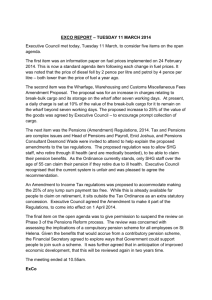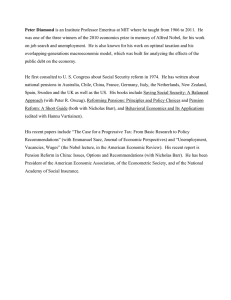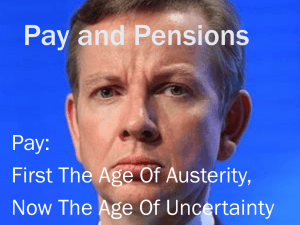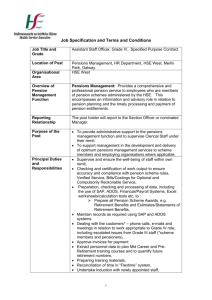Document 11237030
advertisement
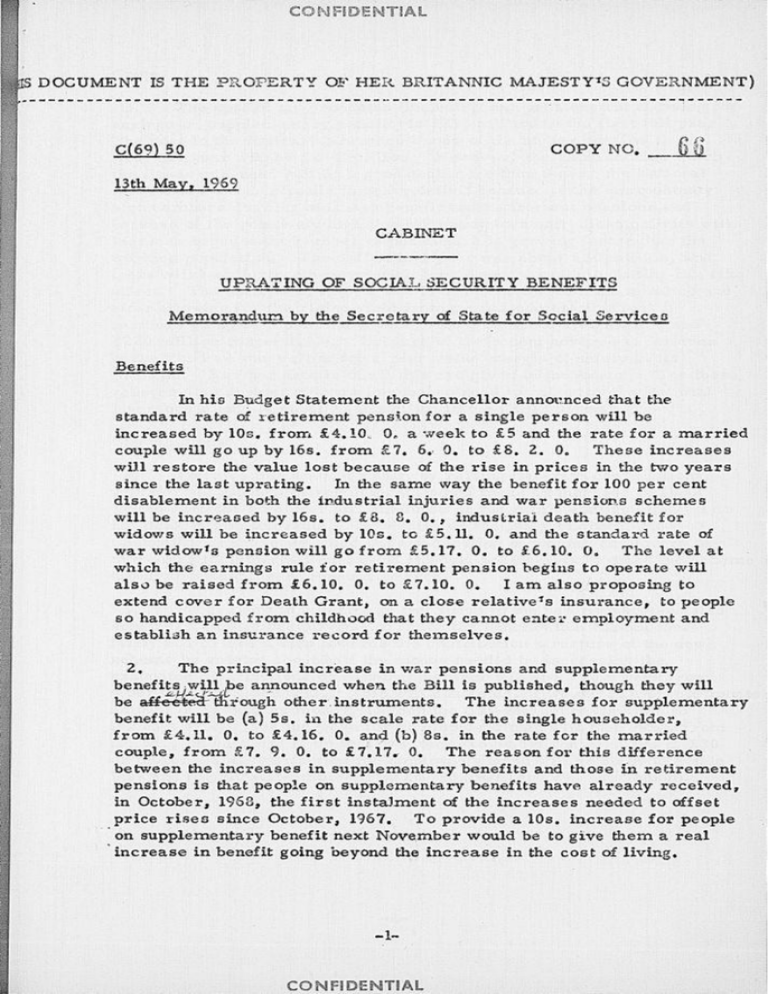
IS DOCUMENT IS THE PR.GPERTY OF HER BRITANNIC M A J E S T Y ^ GOVERNMENT) C(69) 50 COPY NO. 66 13th May, 1969 CABINET UPRATING OF SOCIAL, SECURITY BENEFITS Memorandum by the Secretary of State for Social Services Benefits In his Budget Statement the Chancellor announced that the standard rate of retirement pension for a single person will be increased by 10s. from £4.10, 0, a week to £5 and the rate for a married couple will go up by 16s. from £ 7 . 6. 0. to £ 8 . 2. 0. These increases will restore the value lost because of the rise in prices in the two years since the last uprating. In the same way the benefit for 100 per cent disablement in both the industrial injuries and war pensions schemes will be increased by 16s. to £8. 8, 0. , industrial death benefit for widows will be increased by 10s. to £5.11. 0. and the standard rate of war widow s pension will go from £5.17. 0. to £6.10. 0. The level at which the earnings rule for retirement pension begins to operate will also be raised from £6.10. 0. to £7.10. 0. I am also proposing to extend cover for Death Grant, on a close relative*s insurance, to people so handicapped from childhood that they cannot enter employment and establish an insurance record for themselves. t 2. The principal increase in war pensions and supplementary benefits :Will he announced when, the Bill is published, though they will be affoctedr through other instruments. The increases for supplementary benefit will be (a) 5s, in the scale rate for the single householder, from £4,11. 0, to £4.16. 0. and (b) 8s. in the rate for the married couple, from £7. 9. 0. to £7,17. 0. The reason for this difference between the increases in supplementary benefits and those in retirement pensions is that people on supplementary benefits have already received, in October, 1968, the first instalment of the increases needed to offset price rises since October, 1967. To provide a 10s. increase for people on supplementary benefit next November would be to give them a real increase in benefit going beyond the increase in the cost of living. -1­ Costs 3. The cost of my proposals (including war pensions but allowing for savings on supplementary benefit) is £238 million in the first full y e a r . The cost to the National Insurance Funds of the higher benefits in the first full year will be £243 million. However, the extra income which the Funds will need will be a good deal more than fefeeeej the National Insurance Fund is already in heavy deficit because of the unexpectedly high numbers drawing sickness benefit and retirement pensions and because of the relatively high level of unemployment; these deficits will increase because the number of pensioners is growing faster than the working population. The deficit last year was about £80 million, and there will be a further heavy deficit this year before the irprating can take effect. The deficits in 1970-71 and 1971-72, apart from the upratihg and after allowing for the rising yield from graduated contributions if earnings go up by 3 per cent a year, would be about £160 million and £220 million respectively. Because of the recent adverse experience of the Fund we must allow for a reasonable margin of safety in its finances. Further details of all this are given in the Annex, F o r these reasons, the amount of extra income we need to raif e for the National Insurance Funds is about £440 million in the first full year. Contributions 4, T o raise this amount wholly by raising flat-rate contributions, with normal Exchequer supplement, would mean an increase of about 3s. 6d each for employer and employee on the man^s contribution. I do not think this is tolerable. In winding up the Budget debate, the Chancellor has already ruled out any question of making employers pay more than their normal share and it would not be right to make the scheme unduly dependent on Exchequer finance. 5. "We are now in a period, of transition to the new earnings-related scheme, I therefore propose to share the contribution burden more fairly and to take a step towards the contribution structure of the new scheme by raising about half the money needed by increasing the graduated contributions on earnings between £18 and £30 a week f r o m \ per cent to Z\ per cent. This will enable us, if we put in a proportionate amount of Exchequer money, to keep the flat-rate increase down to I s , 6d a side. The increase for an employed man will then raiage f r o m I s . 6d., on earnings of up to £18 a week, to 6s,Ud. on earnings of £30 or more. The contribution for employed women will go up by Id a side less and for the self-employed by 2s. 8d (men) and 2s, 4d (women). 2­ 6. The following table illustrates how men s contributions (including the National Health Service and industrial injuries elements) will be affected^ t Employees (man s contribution only) 1 INibt contracted out Earnings m Present cosftriw butlOQ Increases New contri­ bution s. d. s. d. £10 17 10 1 6 19 4 £15 22 7 1 6 24 1 £20 25 4 2 9 28 1 £25 25 0 4 10 30 10 £30 26 5 6 11 33 4 £15 19 10 1 6 21 4 £30 21 2 6 11 28 1 Self-employed 22 2 2 8 24 10 Non- employed 17 7 2 2 19 9 Contracted out s. d. Improving the present Graduated scheme 7. I have recognised, of course, that I must find some way of improving the present graduated scheme which will enable us to commend its extension. I propose that we should publicly promise to include graduated pensions earned under the present scheme in the two-yearly revaluation of pensions which is to be a feature of our new pension scheme. 8. The present graudated pensions are built up on the "brick" system. Each £7, 10. 0. which a man pays in graduated contributions (matched by the same payment f r o m his employer) secures 6d a week pension. This pension "brick" remains fixed in cash terms. Ever since the Conservative Government designed the graduated scheme, which they introduced in 1961, we have been sharply critical of its lack of any provision for revaluing the pension " b r i c k " to keep pace with changes in price or earnings levels over l i f e . This deficiency I now propose to remedy. -3­ 9. There is threefold justification. F i r s t , a promise to dynamise (i. e. to revalue) the present graduated pensions, f r o m 1972 onwards, corrects the worst defect of the Conservative Governments scheme. Second, we shall be helping people who are already too old to get much extra, or Indeed anything extra, from our new pension scheme j and this will serve, in a small way, to ease the contrast between old scheme and new scheme pensioners, which is a cause of great concern to the Trades Union Congress ( T U C ) - as indeed it is to m e . Third, it will redress the balance between contracted out and other employees, 10. I have had strong representations from the National Association of Pension Funds about the need for such redress. They have rightly pointed out that in general the contracting out terms have given substantial advantage to contracted out firms and their emphoye-r-s, particularly in recent yearb. This is because the terms have remained unchanged since 1963, despite the rise in interest rates, which haa enabled occupational pension provision to be made more cheaply. Further, employees' occupational scheme contributions can attract tax relief; and these contributions, in the case of contracted out employees, are partly in replacement of State scheme contributions on which employees get no tax relief. 1 Consultations 11, F r o m my consultations with the representative bodies chiefly concerned, I find that the line-up of attitudes to my proposals is as follows. Although neither are formally committed, both the Confederation of British Industry (CBI) and the TUC have indicated that, In principle, they would support a proposal to dynamise these graduated pensions from 1972 onwards. Their membership w i l l , however, be divided on the question whether contracted out employees should get the same amounts of extra pension by being awarded the pension increases they would have had if they had participated fully in the State scheme. It is clear that employers could not be required to provide such increases. Nor could they be provided at the expense of the State scheme, if only because we could not assess what each employee should get. In any event such a move would make the whole operation self-defeating since one of its objects is to redress the balance which has swung too far in favour of the contracted out. The National Association of Pension Funds, which is more fully committed to supporting the line I propose, also has members - though a minority - who will urge that contracted out employees cannot be left outside any pension revaluation. But what all this amounts to is that some people v/ill press us to go even further than we are prepared to go; not that we shall be criticised for going so far. 12, The most serious opposition comes f r o m the Life Offices Association. They have warned me that they v/ould regard an undertaking to dynamiae the graduated pensions as tantamount to retrospective revision of the terms cf a contract entered into by the Government, -4­ unless (which, as I have ex-sef*5pied, is impracticable) contracted out employees v/ere to be given the same extra pension as if they had not been contracted out. I am told that the British Insurance Association, which represents the whole of the insurance world, fully shares the Life Offices! view. A rather similar line may be taken by most of the nationalised industries. 13 There are some powerful points we can make in countering these complaints. In the first place, It Is, and will'remain, open to employers to cease contracting out if they want to, and to buy people still in their employment back into the State scheme on well-established terms, which we do not propose to alter. Although there are complicating factors which makes this less than a complete answer, there Is here a road open to those employers who wish to take it - indeed one of the Life Offices' feare Is that many will decide to do so. . Second - even-although some schemes may well be brought back into the State scheme - it is only a small proportion of contracted out employees who will in practice be left with occupational pensions which are actually of a lower amount than the additional pension they could otherwise have received from the State scheme. Among the S\ million employees currently contracted out by far the largest single group at risk are in the Mineworkers' Scheme, with a membership of about 400, 000; but I understand that this scheme is, in any event, overdue for MSiproveraent. There may also be something like, say, 300,000 or 400,000 of those currently contracted out in the private sector who would be left with occupaticnal pensions lower than the graduated pensions they would otherwise have received from the State scheme and for whom nothing at all could be done. The overall picture i s , then, that only a relatively small minority of those contracted out would be left with occupational pensions significantly smaller than the extra State pension they might otherwise have received. t 14, There is also a much more general point. What, in effect, we shall be deciding are the terms on which the present graduated scheme should be wound up before it has run anything like its full term. The shortness of its life means that the extent to which participants can have earned bigger pensions than contracted out employees will be strictly limited, and that in consequence to give future increases on those pensions which contracted out employees do not share need produce no marked disparity. To promise that the present graduated pensions will be dynamised, as I propose, is entirely consistent with the arrangements which will obtain under the new scheme. Indeed - as the C 3 I have pointed out - It would look increasingly odd in future years if just that small part of the State pension, representing the graduated pension earned under the present scheme, were left frozen in cash terms. 15. - The coot of dynamising the graduated pensions i r o m 1972 can be accommodated within the White Paper estimates of expenditure since these were based on constant (April, 1968) earnings. In cash terms, revaluation would cost something like £2 million or £3 million a year at the first uplift; and assuming, by way of illustration, 5 per cent a year post-award dynamism, the annual cost could have grown to about £43 million by 1982-83. Even by the end of the century, however, the cost would represent no more than about Zj per cent of total pension expenditure - or in terms of contributions about 1/7 per cent a side of reckonable earnings. More immediately, the step I propose will be of financial advantage to us because it should deter from contracting out certain leading employers (such as Unilever and Shell) who have threatened to do so if we fail to redress the balance between contracted out and other employees by dynamising the graduated pensions, 16. Everything points therefore to giving the undertaking I propose; and with this in the package, the increases in gradviated contributions will be made a good deal more palatable,,Conclusion 17. I invite my colleagues to;­ (l) approve the various benefit increases (paragraphs 1-2); (2) approve the contribution increases I have suggested (paragraphs 4-6); (3) authorise the publication of the Bill on 21st May and that a statement should be made at the same time about the intention to dynamise the graduated pension as from the commencemsnt of the new scheme. R. U.S,C. 0 Department of Health and Social Security, S.E.1. 13th May, 1969 ANNEX Note on d e f i c i t s i n the National Insurance Fmxds 1. I t was always known that the number o f pensioners would be growing f a s t e r than the working population u n t i l a f t e r 1980. For t h i s reason, the Conservative Act of 1959 provided f o r contributions to be increased without any increase in b e n e f i t s , at f i v e - y e a r l y i n t e r v a l s between 1965 and 1980. Such an increase, y i e l d i n g about £90 m i l l i o n , i s due next A p r i l . As was done i n 1965, I propose t o cancel t h i s increase and absorb i t into the uprating. 2. Over the l a s t few years the number o f pensioners has been growing f a s t e r than expected because thejr have been r e t i r i n g sooner and l i v i n g l o n g e r . some years there has a l s o been a marked increase in the l e v e l o f For sickness. F i n a l l y , unemployment i s a t a h i s t o r i c a l l y high l e v e l and the number o f people at work has been shrinking. 3. For these reasons the National Insurance Fund had an unexpected d e f i c i t of £92 m i l l i o n in 1967/68 and a d e f i c i t o f about £80 m i l l i o n l a s t y e a r . This was dn s p i t e of our having put up the contributions l a s t May, without any increase in b e n e f i t s , under the Public Expenditure and Receipts A c t . Further, i n December we had to get the authority of the Commons to draw £200 m i l l i o n from the National Insurance (Reserve) Fund merely in order to keep the National Insurance Fund in balance. Even with t h i s reinforcement the Fund w i l l again be approaching an uncomfortably low l e v e l by next winter. Even a f t e r the contribution increases I am proposing, there is l i k e l y to be a d e f i c i t o f some £90 m i l l i o n this y e a r . 4. The e f f e c t of the proposals i n the paper w i l l be t o produce a surplus o f about £AO m i l l i o n i n 1970/71 and & d e f i c i t of about £25 m i l l i o n i n 1971/72. I f earnings r i s e f a s t e r than 3 per cent the position w i l l be rather b e t t e r and provide some a d d i t i o n a l safeguard against further adverse experience.

